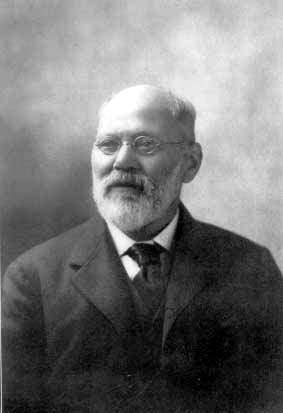
Michael Levi Rodkinson (1845-1904) was quite a character. The title of Marvin J. Heller's essay about him says plenty: "Michael Levi Rodkinson - The Life and Literary Career of a Jewish Scoundrel Revisited." A Jewish scoundrel! There's enough about him available online (you can start by googling [rodkinson +rohling +bloch]), so I won't get into that, but the point of this post is the great derision his "translation" of the Talmud received (according to JD Eisenstein "his" should be in quotes, too; he alleged that Rodkinson was such a lousy scholar that he engaged poor young men to translate it into Yiddish. He'd then tell them they did a lousy job, fire them without paying, and translated their translation into English).
In any case, he forever made his mark on history by his abridged translation of much of the Talmud, which can be read in its entirety here. A nice overview of the issues surrounding this translation can be read in Rabbi Adam Mintz's articles The Talmud in Translation and Words, Meaning and Spirit: The Talmud in Translation.
The Rosh Hashanah volume was published in 1895, and included the following letters and testimonials in the beginning:
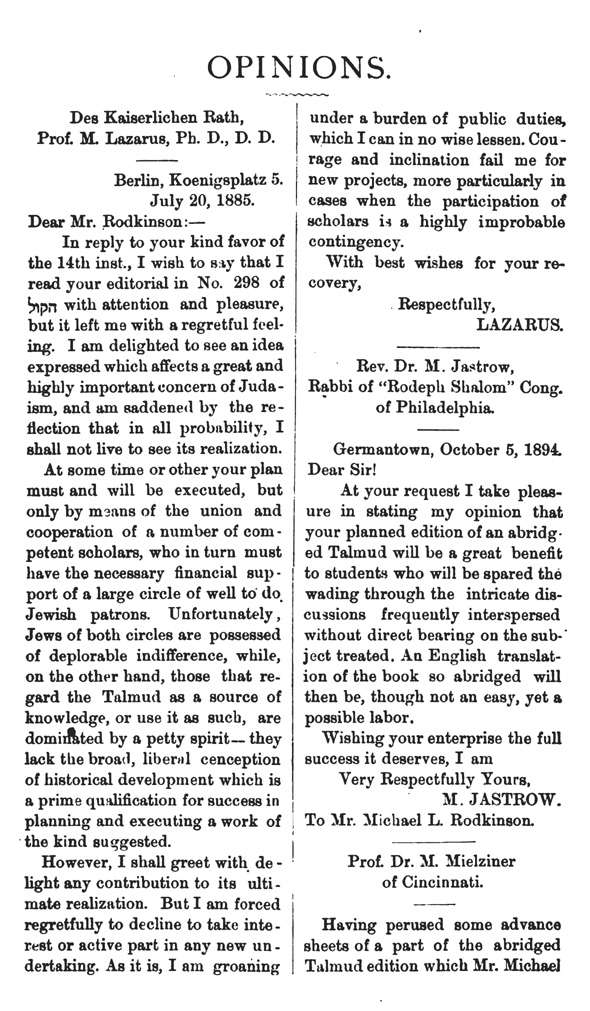










Having published two volumes, his work came in from some devastating critique from Kaufmann Kohler in the American Hebrew in 1896; one notes that he seems to use the Rodkinson Talmud as a cudgel with which to beat Isaac M. Wise with. Yet the critique is highly substantive, and gives us some memorable lines. Taking Rodkinson to task for the most absurd uses of modern terms to translate Talmudic expressions, he suggests that he may as well translate מעשה מרכבה as "Torah on bicycles!" Kohler notes that any child who knows the Pesach Haggadah will not translate "B'ne B'rak" as "the children of Barak":
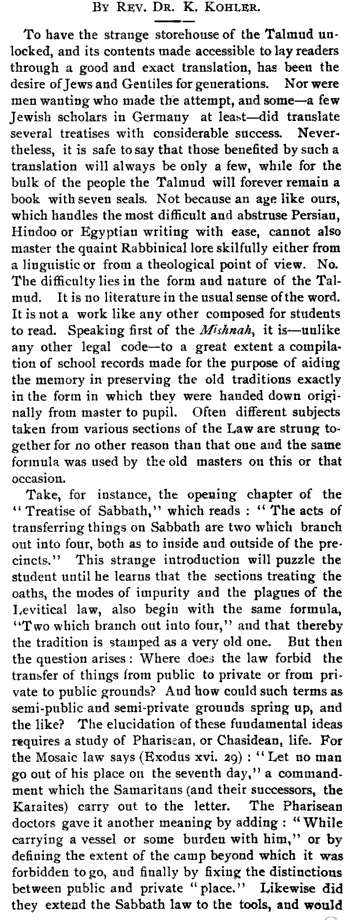
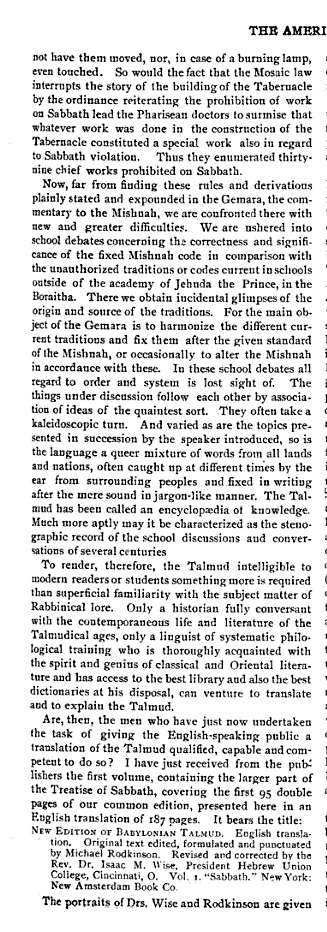
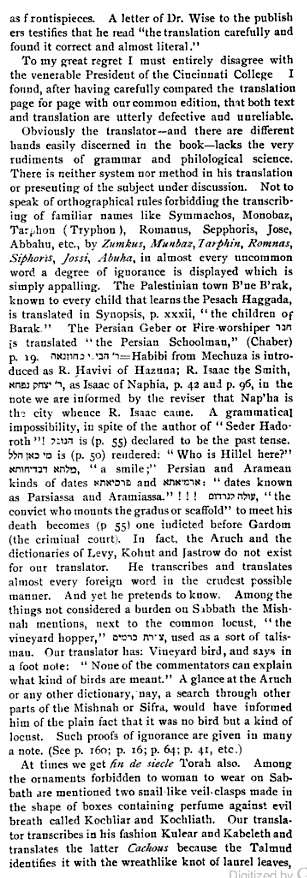
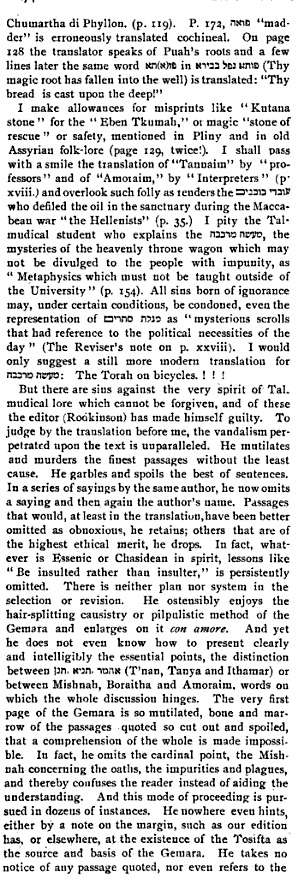

Kaufmann Kohler, incidentally, in his youth was a student of Rabbi Samson Rafael Hirsch. Like many a young man of his era, Rabbi Hirsch's influence kept him Orthodox. Until it didn't. In his 'Personal Reminiscences of My Early Life' he writes "My Arabic studies under Prof. Mueller in Munich at once undermined the exegetical system of S. R. Hirsch, built upon the assumption that Hebrew was the original language, and the philosophical and historical lectures I attended knocked the bottom out of his whole theology. I passed days and weeks of indescribable woe and despondency ; the heavens seemed to fall down upon me and crush me; and the strange tone of my letters puzzled my dear parents so as to make them suspect me of having fallen into bad company. I rallied strength and traveled to Frankfurt to lay my doubts and scruples before my revered teacher; but instead of having these satisfactorily removed, I received the remarkable answer: "My dear Kohler, he who wants to journey around the world must also pass the torrid zone; proceed and you will come back safely." I proceeded in my studies, but did not come back to where I started from. I only felt that having eaten of the thus long forbidden fruit from the tree of knowledge, my eyes opened and I was driven out of the paradise of my childhood. " Thus was made one of the great American Reform rabbis.
In any event Rodkinson lamely tried to reply:
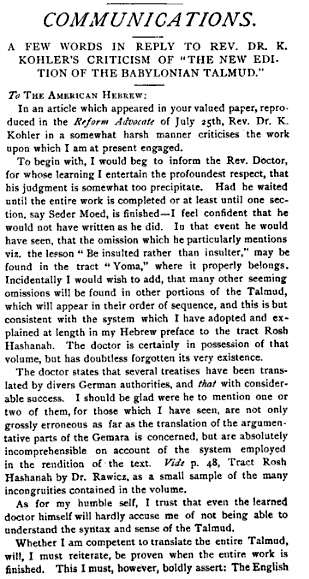
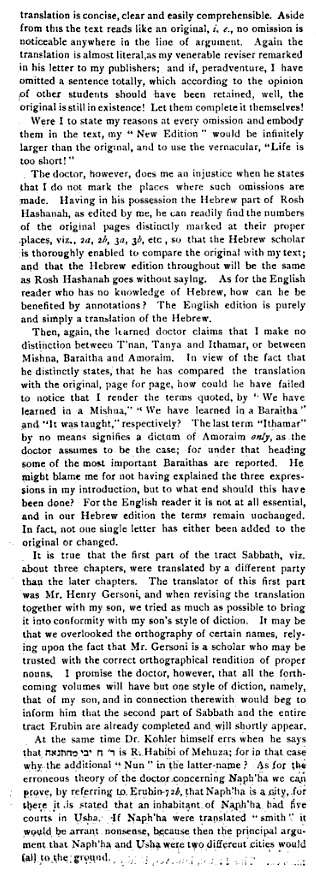
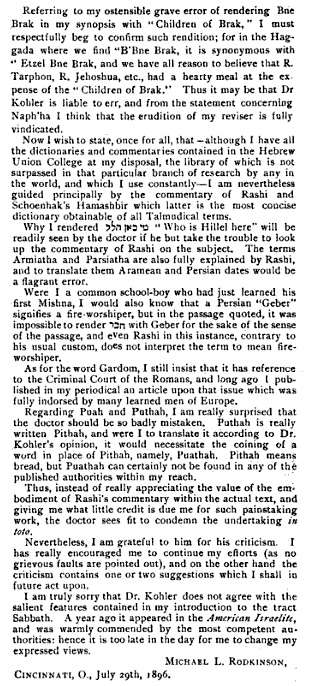
And Kohler replied to him:
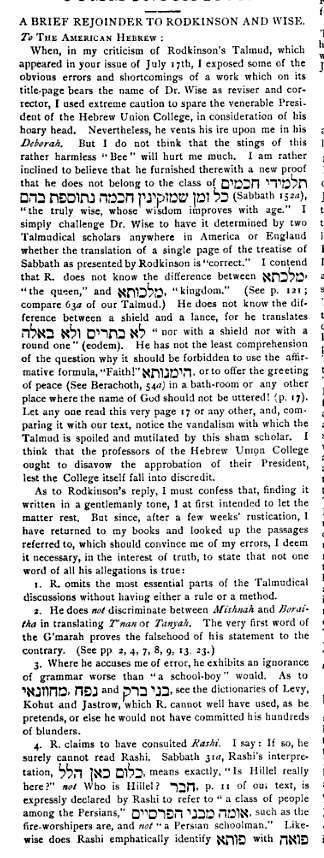
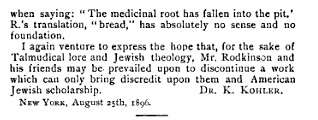
Immediately following Kohler's reply in the American Hebrew was a small piece which had appeared in the Jewish Chronicle of London on August 21, 1896, the original below:
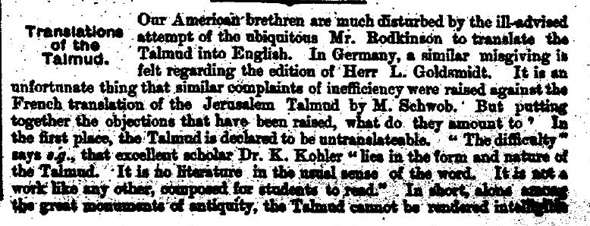
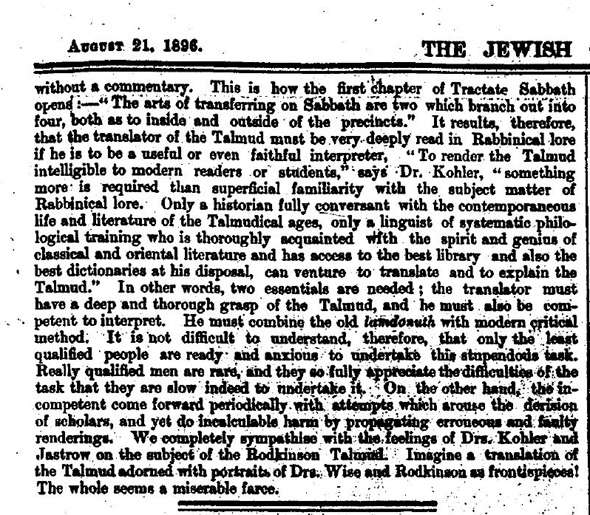
In 1897 the following appeared in the Jewish Chronicle's Books and Bookmen column (the entire series should be collected and published as a book):

And a note in the same column from 1895:
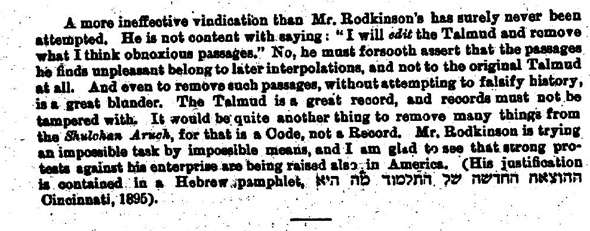
(The 1895 one was written by Solomon Schechter, the one from 1897 by Israel Abrahams. As you can see, Schechter has a problem with an abridgment of the Talmud per se, unlike Marcus Jastrow -- see below. Interestingly he chose to contrast the Talmud -- a record -- with the Shulchan Aruch -- a code -- of which an abridgment is appropriate [ala the Kitzur Shulchan Aruch]. In an early column in 1892, Schechter had taken Rodkinson to task for his book on Tefillin, 'History of Amulets, Charms and Talismans,' in which he asserted that the practice was dropped in the times of the later Amoraim, only to be resumed in the period of the Geonim in opposition to the Karaites.)
When he died in 1904 the nicest thing the Jewish Chronicle could say about him was that he was entitled to some recognition and that, well, his translation was a fait accompli.
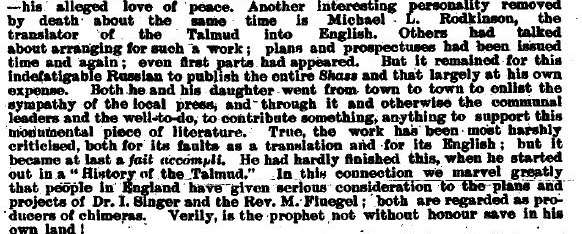

Here is J.D. Eisenstein's devastating (and delightfully interesting) review:
.
Here's a sample of his handwriting:

My thanks to my friend Wolf of Ishim Ve-shitos for sending me a letter of Rodkinson's to Steinschneider. I figure if anyone plans to post or publish it, it should be him. So all you get is this sample of his holy handwriting.
When all is said and done, I feel like he needs a sympathetic word so I'll have to think about that and perhaps produce a second part to this post.
See Manuscript Boy's post on Rodkinson's Talmud from 2006.





i don't remember anything from it, but there is an article in LBIYB about kohler and rav hirsch
ReplyDelete"My Arabic studies under Prof. Mueller in Munich at once undermined the exegetical system of S. R. Hirsch, built upon the assumption that Hebrew was the original language"
ReplyDeleteThat is something about RSRH that I've never understood. Why did he stake such foolish ground? He surely knew enough from his opposition research to know he was wandering off into the weeds. He was usually very sharp about choosing his battles and limiting his dogmas to necessary ones, even when it made him very uncomfortable (e.g. regarding evolution). So why did he choose crank linguistics? And it's not like it was some minor quirk of his; his entire exegetical corpus is founded and shot through with it. I don't understand it, and I think his legacy would be much more universal among Jews (mostly the left half of MO) who would profit from him had he not made that inexplicable choice. Kohler is just a dramatic example of the repurcussions of that choice, but it reverberates until today; Horeb is an embarrassment to the very people who would (and should) adopt RSRH.
"Horeb is an embarrassment"
ReplyDeletei haven't read horeb from cover to cover, but what does it have to with the crank linguistics in his exegesis?
Excuse me, I meant his commentary (though Horeb is not unaffected by it). His collected writings suffer from it too. But aside from which works, what's the answer to the question?
ReplyDeleteI think the answer is that he was not blind to what the scholars of his time were blind to, namely their own errors. I will elaborate more later.
ReplyDeleteI do know who:
ReplyDeleteBasically philology in the 19th century wasn't The Truth, but was on the continuum toward the truth. Rabbi Hirsch, in his critique of aspects of scientific philology, anticipated some very valid critiques of the way in which it was practiced. For example, in his polemic against Frankel he claimed that intensive Greek philology was not the proper way to explain Greek words used in rabbinic literature, but an examination of the way the words were used in the literature itself would yield their proper meaning. This is a very modern, and close to correct, attitude. Indeed, when languages accept foreign words they often do not use them in precisely the same way. French philology will not show that English "mutton" means the meat of a sheep, because "mouton" means the sheep itself. Where he erred was being an extremist, because French or Greek philology can also be an aid, and refusing it on principle itself leads one astray.
What he detected as "scientific" about the normal kind of European philological scholarship was that it was systematic. Well, felt he, his own work was systematic too, and no less scientific.
Thus, I think the answer is simply that he thought he was right, and wasn't intimidated by stiff collars and jargon. It certainly is interesting that he was prepared to make a distinction between natural science and linguistics; I guess he could see practical applications of natural science, which tended to vindicate them as rigorous and true, while linguistics, to him, were just the opinions of people whose flaws he did see.
No, I don't buy it. Were that the issue, then that's what he would have championed--but he didn't. There is no path from your argument to his position; no amount of criticism of the field's specifics can justify the position that Hebrew is a sui generis language. It's like pointing to incorrect classification of pandas due to weaknesses in the morphological methodology of the era to justify believing the world is < 6000 years old.
ReplyDeleteYour defense, were it true, would have left him within the field, albeit as a dissentive view. However, he left the field in favor of foolishness, and it's not for mutton that he left.
If I had to guess, I'd say that he saw putting Hebrew in a historical context as on a continuum (read: slippery slope) with placing things written in Hebrew in a historical context. About that he wouldn't be wrong, both as a psychological insight and as a factual one, since dating of Hebrew definitely was part of dating of things written in Hebrew. It certainly fits his MO (both expansions) of dehistoricizing things (mitzvot, texts, etc.).
ReplyDeleteOr maybe some personal experience of his led to it, e.g. someone close to him started with philology and became an apikorus, forever passuling the field in his eyes.
Whatever the reason, I think was a huge, and rare, blunder from someone so acutely atune to the sensitivies of (then-)modern Jewish minds. Kohler's testimony is fine witness to that.
That's not true. You're thinking of him in terms of his being a late 19th century figure, which may as well be the 20th century, but he was also an early 19th century figure. There was plenty of odd mixtures in scholarship in those times. Professors in universities could get into trouble for heresy. Students had to agree to credal claims to receive diplomas. Although his views on languages make him a crank within the context of his time, he was much, much less of a crank within that context.
ReplyDeleteI don't think Hirsch was ever in the field. In any event, his overarching theory of Judaism was that it could only be understood through Judaism; again, not totally crazy. For example, he was the sort of fellow who realized it was absurd to talk about "the Jewish Church," which is what European study of Jewish history in his time did as a matter of course. This was just an extension of that.
Re your second comment, yes, Kohler's comment attests that it was a blind spot. Imagine, he told Kohler that it wouldn't affect him!
ReplyDeleteSame goes for Graetz, only his problem was historical development in Judaism.
I don't think I'm misplacing him. He definitely lived and wrote in a time where the idea of Hebrew as magic was at the very least disreputable. Moreover, you're not really disagreeing, since you wrote "his views on languages make him a crank within the context of his time." That kind of makes yor comment moot and leaves us with the original question.
ReplyDelete"I don't think Hirsch was ever in the field."
Semantics. Leaving or not joining; he consciously chose his position while aware of the field.
Regarding his overarching theory: irrelevant to the question at hand. The existence of legitimate gripes, whether in regard to linguists, as mentioned above, or in regard to religious sociology cannot be used to explain why he chose indisputably crank linguistics and made it so central to his exegesis.
"Imagine, he told Kohler that it wouldn't affect him!"
ReplyDeleteWell, it didn't affect RSRH. Anyway a strike against my "personal experience" hypothesis.
"Same goes for Graetz, only his problem was historical development in Judaism."
RSRH was playing his part in defining Orthodoxy, the modern fundamentalist movement, and a signature feature of fundamentalism is ahistoricism. It wasn't just Graetz and Kohler that RSRH rejected for putting things in historical context, it was the Rambam too! I think this is far more plausible as a source of explanation for his linguistics than any weaknesses in the contemporary field.
He didn't think it was crank. He felt the only thing which made regular linguistics scientific was that it was systematic, and that he was also scientific (systematic). In other words, the flaws he perceived overwhelmed his senses.
ReplyDeleteI wrote what I thought was a really good reply, and then the power cut out! So let me try again.
ReplyDeleteWhat I meant by pointing out his relationship to the early 19th century was to remind you that scholarship in all sorts of fields was in a far more primitive state than it is today, even if a lot of it is dressed up to sound more advanced. You can't separate his attitude toward academic Jewish studies and the fact that it was modeled on parallel studies in the university, much of it riddled with inappropriate assumptions. As late as the early 20th century this was still the case. I can send you a fascinating article (that I planned to post about some day) written by one of Britain's greatest Orientalists, where he simply repeats as fact that Jews are incapable of conceiving an original idea, and in this way he attempts to explain several phenomena in Judaism via Islam. This person wrote works on Persian literature which are still regarded as essential in the field.
http://en.wikipedia.org/wiki/David_Samuel_Margoliouth he died in 1940.
Yes, obviously any modern reader can see that they're to ignore the blatant racism and unscholarly assumptions, but one can't ignore them as not being there.
I think Hirsch was simply more sensitive to this fact than most Jewish scholars were, and inclined too far in one direction as a result of it. I think Shadal was more profound than him, because he recognized this AND he recognized what was right and true about academic study.
Interestingly enough, Kohler was somewhat unusual as a Reform rabbi, because eventually Reform rabbis were very hostile to academic Jewish scholarship (which is why it came to be associated with Historical or Conservative Judaism) because much of it undermined the theories of Reform. Yet Kohler remained faithful to such study.
There are three problems with that. One, he wasn't systematic. He was only systematic in the same way that the "rules" of gematria are systematic. I don't think I need to explain to explain that to you. Two, as earlier, that would explain his rejection of the mainstream but not explain the position is chose. He could have chosen a non-crank systematic linguistics--as you said, there was more room back then--but he didn't. Three, systematic does not make something scientific, or baraminology would be scientific. Systematic is necessary but not sufficient, and that was not unkown back then. If anything it was the shift of the era; phrenology, astrology, etc. all had elaborate systems. If this means you're right about it being a blind spot, fine, but the blind spot was not in linguistics, but in historicism; according to you his mistake was not including historicism (and naturalism, etc.) in his definition of science.
ReplyDeleteHe thought he was all those things; more importantly, he thought that there was absolutely no more rigor or compelling evidence in normal linguistics. That's right, he was systematic in the way that Gematria is systematic. However, even though you're right that in general it was already known that systematic was necessary, but not sufficient, but "science" was used in a much looser way than it is today, especially in German were the word itself, Wissenschaft, had an expanded meaning. That's why people cringe when they hear academic Jewish studies called "the Science of Judaism," but it was not an inappropriate term for the time. In addition, the writers always speak of Ibn Ezra and Efodi et al being "scientific." Even Saadya was "scientific."
ReplyDeleteI think his mistake was in having one eye open and one eye closed.
"scholarship in all sorts of fields was in a far more primitive state than it is today [...] blatant racism and unscholarly assumptions"
ReplyDeleteI am well aware of both facts. However, they do not explain why he chose a position that was obviously crank even in his era.
Louis Agassiz (1807-1873) was a creationist, perhaps the last reputable one. And yet he did not believe in a 10,000 year old Earth, because no matter how primitive was the state of geology and biology, that position was untenable. He was wrong, but *wasn't* a crank, and he did what you say RSRH did: reject much existing postiions in his field due to flaws he saw.
Yes, in RSRH-era Jewish studies errors abounded and racism lurked under many positions, but that still would not suffice to explain the position he did take, only explain the positions he rejected.
It was a consequence of the outlook he chose to adopt, which was to explain Judaism through Judaism only (as he preceded to write tomes which are only explainable in the context of his being a 19th century German Romantic).
ReplyDeleteIf you adopted that outlook, then sure, Hebrew could emerge as the primal language of man.
"It was a consequence of the outlook he chose to adopt, which was to explain Judaism through Judaism only"
ReplyDeleteSee all of my comments above about historicism, context, fundamentalism. It seems you've come to my side.
"(as he preceded to write tomes which are only explainable in the context of his being a 19th century German Romantic)."
LOL. Thread over.
DF
ReplyDeleteIf I didnt know better, I would think that the foregoing debate between Fred and YKW are actually one man pretending to take both sides in an argument!
DF
DF, I'll take that as a compliment.
ReplyDeleteacheinu kol bes yisroel
ReplyDeleteI'd like to take another look at the premise that R. Hirsch's linguistics were "crank." Although I am neither a professional linguist nor an expert on Hirsch's theories, I think they were "crank" only in part. I will not defend the idea that Hebrew was the original language or that it is "sui generis." However, Hirsch's linguistics have been described as "an elaborate system of Hebrew philology that attempts to establish the true meaning of the Biblical text from within itself based on the etymological and phonetic relationships among the words of the Biblical lexicon." This approach in itself is not crank, as I think S. would agree.
ReplyDeleteAlthough some of Hirsch's word associations based on sound may be far fetched, others do not seem so. For example, he linked the roots "shafat" (to judge) and "shavat" (as in "shevet," i.e. staff of rulership) by explaining that the former meant "to create order and harmony" and the latter meant "to control." Shadal, who had no hangups about comparative Semitic linguistics, similarly derived "shafat" from "shavat." This does not strike me as crank.
So, is Kohler saying Arabic was an older language than Hebrew? Or something else? What does the non-crank linguistics hold about these subjects? Some readers like me simply don't know the facts that others here seem to assume. Please fill us in.
ReplyDeleteI'm not sure what you mean? Are you referring to the fact that he attributes his Arabic studies in university to the realization that Hebrew was not the original language of man? If so, he doesn't mean that Arabic is older.
ReplyDeleteIn general, "non-crank" linguistics does not hold that Hebrew - or really any specific language - is the first language of mankind. Rather, the belief is that languages evolved and evolve into one another. A good example would be the way the Romance languages (e.g., French, Italian, Spanish, etc.) all evolved from Latin.
The reason why people think/ thought Hebrew was the original language of mankind was not based on archaelogical evidence or linguistic studies, but because the Bible said so (or more accurately, people thought it did).
As far as R. Hirsch, he actually rejected the approach of many of the meforshim (including Rashi) who at times made use of related languages to explain Hebrew. R. Hirsch felt that Hebrew alone can explain Hebrew. This would be like holding that Spanish alone can explain Spanish. Why did R. Hirsch take this position? Because he felt that Hebrew (and to a limited extent Talmudic Aramaic) was sui generis, the specially created language of God. Obviously this is not scientific. For his part, R. Hirsch felt that linguistics was no more scientific than his own system. He seems to have felt that "scientific" meant systematic and coherent, and given that he claimed that his own system was at least, if note more, scientific than the so-called scientific study of languages.
Is that what you're asking?